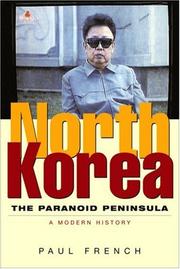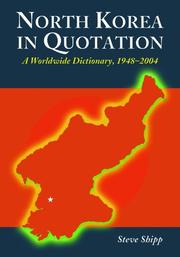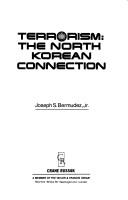| Listing 1 - 10 of 591 | << page >> |
Sort by
|

ISBN: 1842779052 9781842779057 Year: 2007 Publisher: London: Zed books,
Abstract | Keywords | Export | Availability | Bookmark
 Loading...
Loading...Choose an application
- Reference Manager
- EndNote
- RefWorks (Direct export to RefWorks)
Book
Abstract | Keywords | Export | Availability | Bookmark
 Loading...
Loading...Choose an application
- Reference Manager
- EndNote
- RefWorks (Direct export to RefWorks)
Periodical
Abstract | Keywords | Export | Availability | Bookmark
 Loading...
Loading...Choose an application
- Reference Manager
- EndNote
- RefWorks (Direct export to RefWorks)

ISBN: 078642107X Year: 2005 Publisher: Jefferson McFarland
Abstract | Keywords | Export | Availability | Bookmark
 Loading...
Loading...Choose an application
- Reference Manager
- EndNote
- RefWorks (Direct export to RefWorks)
"The 20 categories covered here provide an overview of the breadth of issues facing the Northeast Asian country. For each quote, the speaker and his or her title are identified, along with the original source of the quotation and its context. Indexed by speaker, subject and keywords"--Provided by publisher.
Periodical
Publisher: [Washington, D.C.] : Library of Congress, Federal Research Division
Abstract | Keywords | Export | Availability | Bookmark
 Loading...
Loading...Choose an application
- Reference Manager
- EndNote
- RefWorks (Direct export to RefWorks)
Periodical
Year: 1966 Publisher: Arlington, Virginia : U.S. Joint Publications Research Service
Abstract | Keywords | Export | Availability | Bookmark
 Loading...
Loading...Choose an application
- Reference Manager
- EndNote
- RefWorks (Direct export to RefWorks)
Book
Year: 1972 Publisher: Seoul Public Relations Association of Korea
Abstract | Keywords | Export | Availability | Bookmark
 Loading...
Loading...Choose an application
- Reference Manager
- EndNote
- RefWorks (Direct export to RefWorks)
Book
Year: 1993 Publisher: Washington, D.C. : Federal Research Division,
Abstract | Keywords | Export | Availability | Bookmark
 Loading...
Loading...Choose an application
- Reference Manager
- EndNote
- RefWorks (Direct export to RefWorks)
Book
ISBN: 9781138654938 9781315178318 9781351712989 9781138452367 Year: 2017 Publisher: London Routledge
Abstract | Keywords | Export | Availability | Bookmark
 Loading...
Loading...Choose an application
- Reference Manager
- EndNote
- RefWorks (Direct export to RefWorks)
A UN arms embargo has been in place against North Korea for nearly a decade, as part of a broader sanctions regime designed to deny it the goods and funds needed to fuel its nuclear weapons and ballistic-missile programmes. Yet despite these sanctions, a host of state and non-state actors continue to buy arms, materiel and services from Pyongyang - and inject funds into the same coffers that drive North Korea's nuclear and missile development. While some of North Korea's military customers in the sanctions era since 2006 are well known - such as Iran, Syria and Burma - Pyongyang's wider client base receives little international attention. North Korea has continued to enjoy access to other defence markets across Africa and the Middle East. The drivers of these clients' decisions to buy weapons and related goods from North Korea are rarely discussed. This gap in analysis is essential to fill. If tailored and effective approaches are to be developed to convince North Korea's customers to buy elsewhere, they must be based on a sound understanding of the considerations that motivated the client to turn to Pyongyang in the first place. This book comprehensively analyses the available information on these procurement decisions. It concludes, contrary to conventional wisdom, that the reasons that customers buy weapons and related goods and services from North Korea vary, often greatly. This study also concludes that one of the greatest achievements of the UN sanctions regime to date has been to deny North Korea access to modern conventional weapons technology that it can learn to manufacture at home and sell on to its clients around the world. Without more contemporary wares to tempt foreign buyers, North Korea will likely continue to see its client list of weapons and related goods and services shrinking.

ISBN: 0844816108 Year: 1990 Publisher: New York Crane Russak
Abstract | Keywords | Export | Availability | Bookmark
 Loading...
Loading...Choose an application
- Reference Manager
- EndNote
- RefWorks (Direct export to RefWorks)
| Listing 1 - 10 of 591 | << page >> |
Sort by
|

 Search
Search Feedback
Feedback About UniCat
About UniCat  Help
Help News
News